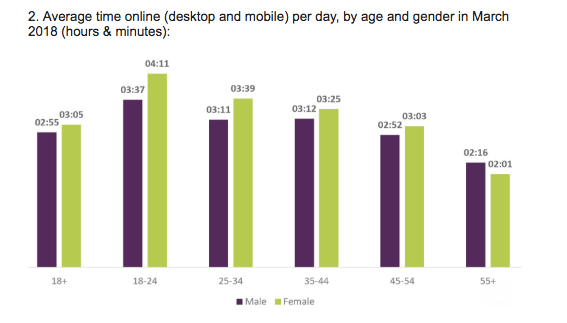

A look back at the past decade of consumer technology use in the UK has shone a light on changing gadget habits, underlining how Brits have gone from being smartphone dabblers back in 2008 when a top-of-the-range smartphone cost ~£500 to true addicts in today’s £1k+ premium smartphone era.
The report also highlights what seems to be, at times, a conflicted relationship between Brits and the Internet.
While nine in ten people in the UK have home access to the Internet, here in 2018, some web users report feeling being online is a time-sink or a constraint on their freedom.
But even more said they feel lost or bored without it.
Over the past decade the Internet looks to have consolidated its grip on the spacetime that boredom occupied for the less connected generations that came before.
The overview comes via regulator Ofcom’s 2018 Communications Market report. The full report commenting on key market developments in the country’s communications sector is a meaty, stat and chart-filled read.
The regulator has also produced a 30-slide interactive version this year.
Commenting on the report findings in a statement, Ian Macrae, Ofcom’s director of market intelligence, said: “Over the last decade, people’s lives have been transformed by the rise of the smartphone, together with better access to the Internet and new services. Whether it’s working flexibly, keeping up with current affairs or shopping online, we can do more on the move than ever before.
“But while people appreciate their smartphone as their constant companion, some are finding themselves feeling overloaded when online, or frustrated when they’re not.”
We’ve pulled out some highlights from the report below…
- Less than a fifth (17%) of UK citizens owned a smartphone a decade ago; the figure now stands at 78% — and a full 95% of 16-24 year-olds. So, yeah, kids don’t get called digital natives for nothin’
- People in the UK check their smartphones, on average, every 12 minutes of the waking day. (‘Digital wellbeing’ tools clearly have their work cut out to kick against this grain… )
- Ofcom found that two in five adults (40%) first look at their phone within five minutes of waking up (rising to 65% of the under 35s). While around a third (37%) of adults check their phones five minutes before lights out (again rising to 60% of under-35s). Shame it didn’t also ask how well people are sleeping
- Contrary to a decade ago, most UK citizens say they need and expect a constant Internet connection wherever they go. Two thirds of adults (64%) say it’s an essential part of their life. One in five adults (19%) say they spend more than 40 hours a week online, up from 5% just over ten years ago
- Three quarters (74%) of people say being online keeps them close to friends and family. Two fifths (41%) say it enables them to work more flexibly
Smartphone screen addicts, much?
- Seventy-two per cent of adults say their smartphone is their most important device for accessing the Internet; 71% say they never turn off their phone; and 78% say they could not live without it
- Ofcom found the amount of time Brits spend making phone calls from mobiles has fallen for the first time — using a mobile for phone calls is only considered important by 75% of smartphone users vs 92% who consider web browsing on a smartphone to be important (and indeed the proportion of people accessing the Internet on their mobile has increased from 20% almost a decade ago to 72% in 2018)
- The average amount of time spent online on a smartphone is 2 hours 28 minutes per day. This rises to 3 hours 14 minutes among 18-24s
Social and emotional friction, plus the generation gap…
- On the irritation front, three quarters of people (76%) find it annoying when someone is listening to music, watching videos or playing games loudly on public transport; while an impressive 81% object to people using their phone during meal times
- TV is another matter though. The majority (53%) of adults say they are usually on their phone while watching TV with others. There’s a generation gap related to social acceptance of this though: With a majority (62%) of people over the age of 55 thinking it’s unacceptable — dropping to just two in ten (21%) among those aged 18-34
- Ofcom also found that significant numbers of people saying the online experience has negative effects. Fifteen per cent agree it makes them feel they are always at work, and more than half (54%) admit that connected devices interrupt face-to-face conversations with friends and family — which does offer a useful counterpoint to social media giant’s shiny marketing claims that their platforms ‘connect people’ (the truth is more they both connect & disconnect). While more than two in five (43%) also admit to spending too much time online
- Around a third of people say they feel either cut off (34%) or lost (29%) without the Internet, and if they can’t get online, 17% say they find it stressful. Half of all UK adults (50%) say their life would be boring if they could not access the Internet
- On the flip side, a smaller proportion of UK citizens view a lack of Internet access in a positive light. One in ten says they feel more productive offline (interestingly this rises to 15% for 18-34 year-olds); while 10% say they find it liberating; and 16% feel less distracted
The impact of (multifaceted and increasingly powerful and capable) smartphones can also be seen on some other types of gadgets. Though TV screens continue to compel Brits (possibly because they feel it’s okay to keep using their smartphones while sitting in front of a bigger screen… )
- Ofcom says ownership of tablets (58% of UK households) and games consoles (44% of UK adults) has plateaued in the last three years
- Desktop PC ownership has declined majorly over the past decade — from a large majority (69%) of households with access in 2008 to less than a third (28%) in 2018
- As of 2017, smart TVs were in 42% of households — up from just 5% in 2012
- Smart speakers weren’t around in 2008 but they’ve now carved out a space in 13% of UK households
- One in five households (20%) report having some wearable tech (smart watches, fitness trackers). So smart speakers look to be fast catching up with fitness bands
BBC mightier than Amazon …
- BBC website visitor numbers overtook those of Amazon in the UK in 2018. Ofcom found the BBC had the third-highest number of users after Google and Facebook
- Ofcom also found that six in ten people have used next-day delivery for online purchases, but only three in ten have used same-day delivery in 2018. So most Brits are, seemingly, content to wait until tomorrow for ecommerce purchases — rather than demanding their stuff right now
What else are UK citizens getting up to online? More of a spread of stuff than ever, it would appear…
- Less general browsing/surfing than last year, though it’s still the most popular reported use for Internet activity (69% saying they’ve done this in the past week vs 80% who reported the same in 2017)
- Sending and receiving email is also still a big deal — but also on the slide (66% reporting doing this in the past week vs 76% in 2017)
- Social media use is another popular but slightly less so use-case than last year (50% in 2017 down to 45% in 2018). (Though Twitter bucks the trend with a percentage point usage bump (13% -> 14%) though it’s far less popular overall)
- Instant messaging frequency also dropped a bit (46% -> 41%)
- As did TV/video viewing online (40% -> 36%), including for watching short video clips (31% to 28%)
- Online shopping has also dropped a bit in frequency (48% -> 44%)
- But accessing news has remained constant (36%)
- Finding health information has seen marginal slight growth (22% -> 23%); ditto has finding/downloading information for work/college (32% -> 33%); using local council/government services (21% -> 23%); and playing games online/interactively (17% -> 18%)
- Streaming audio services have got a bit more popular (podcasts, we must presume), with 15% reporting using them in the past week in 2017 up to 19% in 2018. Listening to the radio online is also up (13% -> 15%)
- However uploading/adding content to the Internet has got a bit less popular, though (17% to 15%)
One more thing: Women in the UK are bigger Internet fans than men.
Perhaps contrary to some people’s expectations, women in the UK spend more time online on average than men across almost all age groups, with the sole exception being the over 55s (where the time difference is pretty marginal)…


